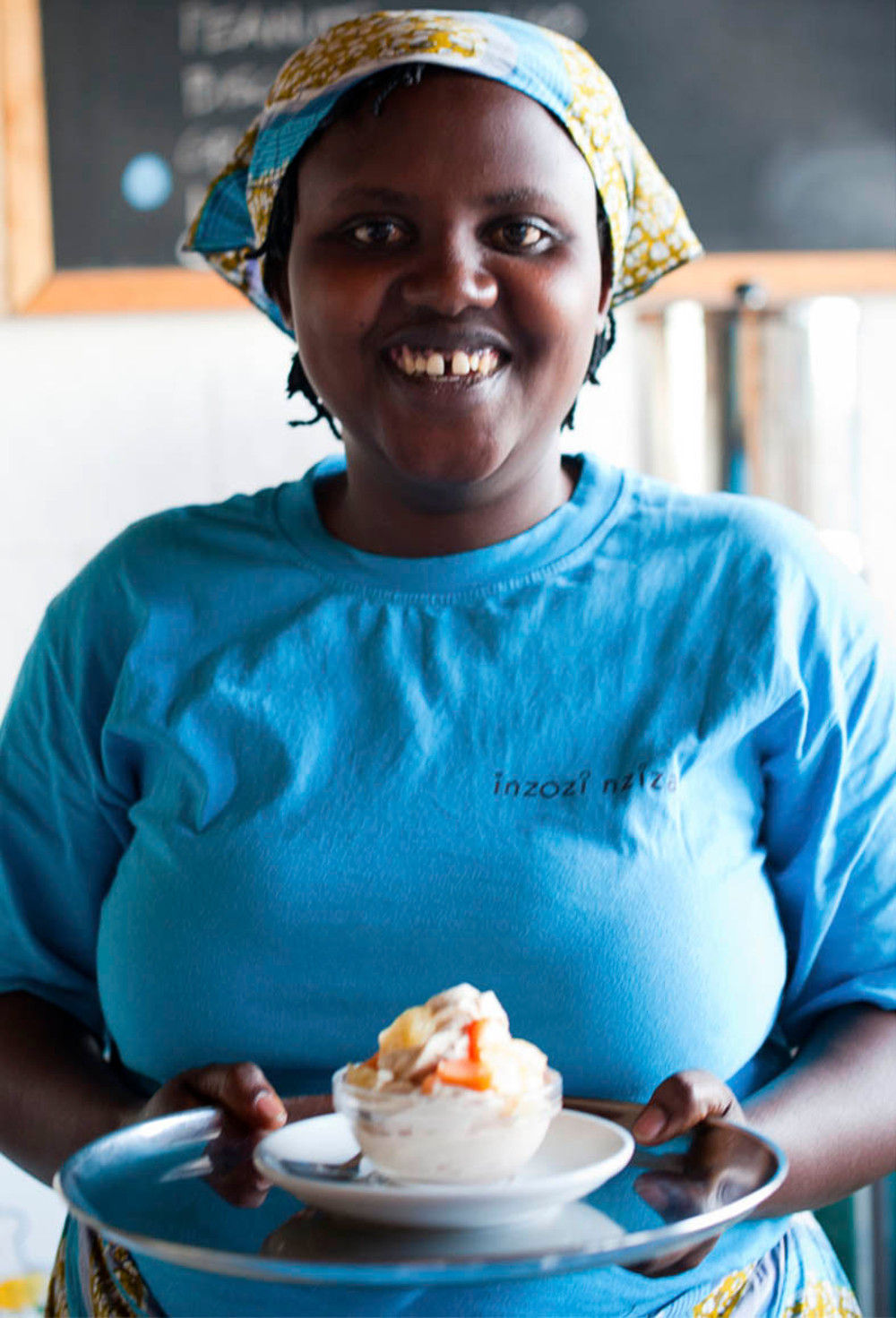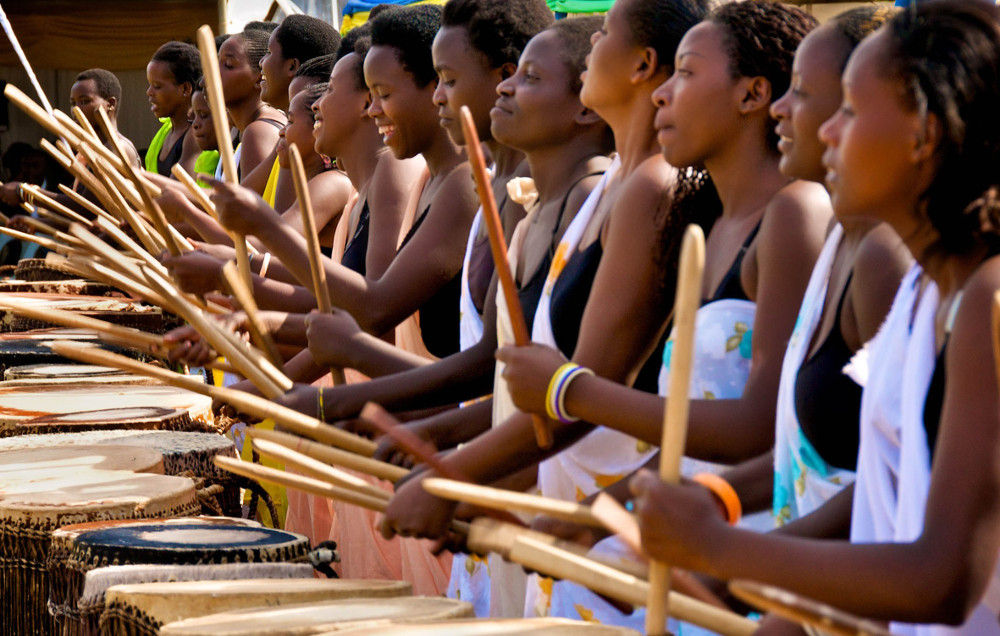Odile 'Kiki' Gakire Katese started Inzozi Nziza
In some parts of the world, it might sound melodramatic to say ice cream is life-transforming. But in a city in Rwanda, ravaged by genocide 20 years ago, the sweet treat has had a radical impact on a group of women affected by the massacre.
Louise Ingabire says: “I didn’t have a job before; I just stayed at home. Now I have a vision for the future. I’m making money and I can give some of it to my family.”
Ingabire, who was seven when her father, two brothers, sister and cousins were killed in 1994, is the manager of Inzozi Nziza (meaning “sweet dreams” in the local Kinyarwanda language), the country’s first and only ice-cream shop.
“Ice cream is important to me because it’s changed my life. When I eat it, I’m very happy and try to forget about the problems I have. Many times I’m very tired and think about what happened and what to do, many things are on my mind. But, when I take ice cream, I feel new and I have more energy.”
Inzozi Nziza was founded in 2010 by theatre director Odile “Kiki” Gakire Katese in partnership with Brooklyn-based ice-cream company Blue Marble Dreams. She had created Ingoma Nshya (“new drum”), Rwanda’s first female drumming troupe comprising Tutsi and Hutu orphans, widows, wives and children of the genocide perpetrators, six years earlier.
In need of joy
She told the Blue Marble Dreams founders, Alexis Miesen and Jennie Dundas, whom she met at the Sundance Institute Theatre Lab in the United States in 2009, that, as much as Rwanda needed nutritious food and clean water, the people also needed “fun, joy, pleasure and laughter”.
Today the ice-cream store employs nine Rwandan women who are also members of the troupe. They spend their days serving soft-serve swirls made from local milk and honey and imported vanilla beans and cocoa, using a machine that came from South Africa, and their spare time practising drumming.
Miesen says: “In the beginning, the learning curve was fairly steep, as many people in the community had never tried ice cream. But it has really caught on and now is quite popular. I would say that the response has been very similar to our customers in Brooklyn – less the initial unfamiliarity. There’s something universally appealing about ice cream and its magic.”

Louise Ingabire is the manager of Inzozi Nziza in the Rwandan city of Butare. (Piper Watson Photography)
Miesen says people flock to Inzozi Nziza, even from neighbouring Burundi, about a three-hour drive from Butare, Rwanda’s second largest city. It is home to the National University of Rwanda, the nation’s first institution of higher learning and its largest.
The small city, about 135km from Kigali, was already known as Rwanda’s intellectual capital and, today, is home to the first women drummers. Before Ingoma Nshya was established, Rwandan women were not permitted to touch the cowhide drum, which was regarded as sacred. Like the first ice-cream store, it is a milestone.
Miesen says: “Everything was turned upside down post-genocide and Rwandans had an opportunity to rebuild both the physical and cultural infrastructure of their country. Women made up more than 70% of the population so they had not just the chance but also the necessity to step into places and positions that were previously off limits to them.”
No-brainer
A shop serving ice cream with flavours such as sweet cream, passion fruit, strawberry, pineapple and, being Rwanda, coffee – plus tea, coffee, sandwiches, cakes and more –might seem like a no-brainer to some.
“It was an answer to some of the problems of the students; we needed a shop with coffee and ice cream,” says Kalisa Migendo (24), an agriculture student, who tasted ice cream for the first time in 2012. “You can only get it in the supermarket but it’s very expensive. In Kigali, there are no ice-cream shops.”

Odile ‘Kiki’ Gakire Katese also started the popular women’s drumming troupe Ingoma Nshya. (Blue Marble Dreams)
Ingabire, who first tasted it on a 2009 drumming tour, describes it as, well, cold. “It was the first time I had tasted something that was cold like that. Also, I didn’t know what it was, how they made it. I didn’t like it.”
But even on an overcast day during Rwanda’s rainy season, locals stream through Inzozi Nziza’s door, past a chalkboard announcing “Ice cream is back”.
Today, Ingabire is hooked on it.
“Slowly by slowly, you get used to it. Now, when I finish one cup, I need to take more.”
International performances
Ingoma Nshya has more than 100 members and has performed in Rwanda and abroad.
“Drumming makes my life strong,” a proud 27-year-old Clementine Uwintije says.
A film about the remarkable women dreamers who became drummers then ice-cream makers has been produced and directed by the award-winning filmmaker siblings Rob and Lisa Fruchtman. Sweet Dreams has already been shown in more than a dozen countries, including the US, Canada, Britain and Zambia.
“We plan to share a portion of the income we have received with the women’s ice-cream and drumming co-ops,” says Rob. “When we return to Rwanda to premiere the film later this year, we will film further with the women and at the shop.”
The founders of Blue Marble Dreams have been so inspired by their Rwandan success that they are developing plans to open a Sweet Dreams outlet in Port-au-Prince in Haiti.